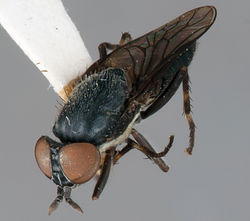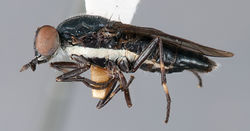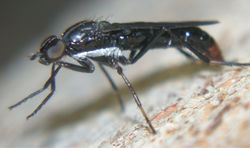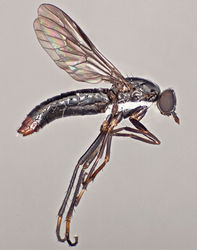Vomerina
| Notice: | This page is derived from the original publication listed below, whose author(s) should always be credited. Further contributors may edit and improve the content of this page and, consequently, need to be credited as well (see page history). Any assessment of factual correctness requires a careful review of the original article as well as of subsequent contributions.
If you are uncertain whether your planned contribution is correct or not, we suggest that you use the associated discussion page instead of editing the page directly. This page should be cited as follows (rationale):
Citation formats to copy and paste
BibTeX: @article{Winterton2012ZooKeys218, RIS/ Endnote: TY - JOUR Wikipedia/ Citizendium: <ref name="Winterton2012ZooKeys218">{{Citation See also the citation download page at the journal. |
Ordo: Diptera
Familia: Therevidae
Name
Vomerina Winterton, 2007 – Wikispecies link – ZooBank link – Pensoft Profile
Type species
Vomerina humbug Winterton, 2007: 22.
Diagnosis
Body length 6.5–8.0 mm. Body glossy black with matte white (or silver) lateral stripe of dense pubescence on pleuron, usually extending to anterior segments of abdomen; male frons wider than ocellar tubercle at narrowest point; parafacial setae absent; male with single row of postocular setae; lower frons and face slightly to greatly protruding anteriorly; antenna length shorter than or equal to head length; scape cylindrical or bulbous; flagellum conical, style terminal; sternum with medial furrow lacking setal pile; posterior surface of mid coxa lacking setal pile; wing cell m3 closed; elongate velutum patches present on fore and hind femora; femora without macrosetae; male genitalia without medial atrium, inner gonocoxal process absent or greatly reduced; ventral lobe large, plowshare-shaped, projecting posteromedially with dense medial covering of velutum; dorsal apodeme of parameral sheath well sclerotized; ejaculatory apodeme and lateral ejaculatory apodeme short; gonocoxal apodeme much shorter than gonocoxite length; female with three spermathecae; spermathecal ducts joined to common spermathecal sac duct; acanthophorite spines A1 and A2 present, well developed.
Comments
Winterton (2007)[1] erected Vomerina based on the male of Vomerina humbug. The stripe of pubescence on the lower portion of the pleuron is distinctively matte white (almost glaucous gray) in Vomerina humbug and Vomerina comapenis sp. n., where it continues onto the posterior surface of the head and onto the anterior segments of the abdomen. In Vomerina micora sp. n., the stripe of dense pubescence is present only on the thorax and is silver. This type of pleural stripe is also found in many species of Bonjeania (e.g. Bonjeania zwicki Winterton, 2007) and numerous species of Parapsilocephala Kröber, 1912 and Acraspisa Kröber, 1912. There is a distinct similarity in body shape between Vomerina and certain Bonjeania species such as Bonjeania webbi Winterton 2007[1] and Bonjeania bapsis Winterton, 2007. All have a conical head and similar body shape, but most Bonjeania species lack the distinct pleural stripe of pubescence, have a medial atrium and small ventral lobe on the male gonocoxites, while females have only a single spermatheca.
Included species
Vomerina comapenis sp. n., Vomerina humbug Winterton, 2007, Vomerina micora sp. n.
Key to Vomerina species
Taxon Treatment
- Winterton, S; Ferguson, D; 2012: New species of Vomerina Winterton (Diptera, Therevidae, Agapophytinae) from Australia ZooKeys, 218: 65-75. doi
Other References
- ↑ 1.0 1.1 Winterton S (2007) New species of Acraspisoides Hill & Winterton and Bonjeania Irwin & Lyneborg (Diptera: Therevidae: Agapophytinae), with the description of a new genus. Zootaxa 1438: 1-25.
Images
|



